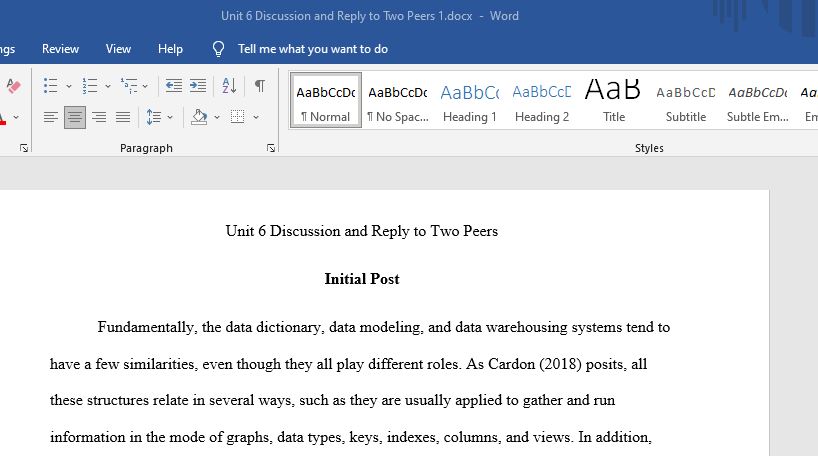Research and compare and contrast the following: data dictionary, data modeling, and data warehousing.
Research and compare and contrast the following: data dictionary, data modeling, and data warehousing.
Data dictionary is defined as a tool that provides metadata or data about data, Data modeling is a representation of the data that has to be stored in a database and the relationships between both tables and data fields, and data warehousing is a database which makes it possible to access data from several databases and combine the results into a one single query and reporting interface. They all compare in several ways such as being used by healthcare professionals, they all describe the ingredients and steps to create relevant reports from a relational database, and used to store data. In contrast data modeling in operational database systems directly target efficiently supporting simple transactions in the database such as retrieving, inserting, deleting, and the of changing data. However, data warehouses are designed for the customer with general information knowledge about the enterprise, but operational database systems are more oriented toward use by software specialists for creating distinct applications. Data modeling follows principals and different patterns found in architecture for data warehousing and business intelligence.
References
Knight,M.(2017). What is a data dictionary?. Retrieved from:https://www.dataversity.net/what-is-a-data-dictionary/#
Biedermann,S. (2017). Introduction to Healthcare Informatics ( 2nd edition)
reply to peer:
Unit 6
A data model, data dictionary, and data warehouse are all utilized by healthcare professionals to organize and store patient information. They are similar in the sense that they are all used in order to securely manage the information and store the data. The differences between them becomes clear when you see that each one is responsible for a slightly different task than another one. But what are they really, what do they mean? A data model is an “abstract model that organizes data elements and their relationships. It is not related to any implementation. Data model may be represented in many forms, such as Entity Relationship Diagram or UML Class Diagram” (Kononow, 2016). Whereas a data dictionary is “a reference and description of each data element. It is a detailed definition and documentation of data model. It can have two levels of abstraction: physical and logical” (Kononow, 2016). Finally, a data warehouse is “a system used for reporting and data analysis and is considered a core component of business intelligence” (Kononow, 2016). When you put all of them together you get a full process. The stage part of the process and the purpose of it is what I thought was most important to know. The following is something that I found on Dataedo while researching and found it interesting.
Stage:
·Data Model: Conceptual system modeling
·Database Schema: System implementation
·Data Dictionary (Logical): Detailed system design, documentation
·Data Dictionary (Physical): System implementation, documentation
·ERD: Conceptual system modeling, documentation
Purpose:
·Data Model: Data design
·Database Schema: Database implementation
·Data Dictionary (Logical): Define each data attribute in data model – data model supplement
·Data Dictionary (Physical): Design and documentation of each data attribute in database schema
·ERD: Communicate data model in relational databases
References
Definition: Data warehousing. Informatica. (n.d.). Retrieved September 29, 2021, from https://www.informatica.com/services-and-training/glossary-of-terms/data-warehousing-definition.html.
Kononow, P. (2016, November 21). Data model VS data dictionary VS Database schema vs Erd – Dataedo Blog. Dataedo. Retrieved September 29, 2021, from https://dataedo.com/blog/data-model-data-dictionary-database-schema-erd.
Requirements: see details | .doc file
Answer preview:
 word limit:420
word limit:420
